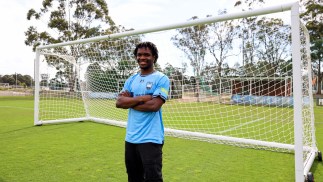With the proven success of Australian coaches over the past few years, is it now time for the A-League to consider closing its doors to the imported coach?
With the proven success of Australian coaches over the past few years, is it now time for the A-League to consider closing its doors to the imported coach?
Western Sydney’s premiership triumph in 2012/13 marks the third season in a row where an Aussie coach guided his troops to the top of the ladder.
With Tony Popovic, Graham Arnold and Ange Postecoglou the stand-out coaches this season, and other former Socceroos the likes of Mike Valkanis, Alistair Edwards and Frank Farina being called in to the rescue throughout the season, it seems the reliance on football brains from abroad is just not needed any more.
It wasn’t always like this. In fact it used to be quite the opposite.
If we turn back the clock to when the National Soccer League kicked off in 1977 we find just one Australian-born coach of a national league club – the original Captain Socceroo himself, Johnny Warren.
The remaining inaugural head NSL coaches were a diverse assembly born in Egypt, France, Germany, Greece, Poland, the United Kingdom and the former Yugoslavia.
It’s fascinating to look at the range of origins and backgrounds of these overseas-born coaches from NSL match day one.
Gerry Chaldi, coach of the first NSL champions Eastern Suburbs Hakoah, was a former Israeli international player originally from France. South Melbourne’s Egypt-born Manny Poulakakis played in Greece and coached in Egypt, France and Syria before migrating to Australia.
Adelaide City’s coaching panel consisted of Polish-born Edmund Kreft, Portugese import Alvaro Oliveira, Hungarian-turned-Australian Charlie Horvath and Italian migrant Bob D’Ottavi.
And granted that a couple of overseas-born coaches from the 1977 season had lived most of their lives in Australia, namely Les Scheinflug and Manfred Schaefer, there remained only a handful of Australian born or bred first-grade coaches at the time.
In fact right throughout the first 20 years of the NSL, Australian-raised coaches were very few and far between.
In 1988 it seemed Marconi – one the of country’s most ambitious clubs at the time – was taking a big punt in employing untried Berti Mariani as coach.
The former Marconi player was the first Australian-born coach appointed at the start of an NSL season for almost a decade.
And when Marconi won back-to-back NSL championships in 1988 and 1989 with Mariani at the helm, you would have thought that the other clubs may have started to have more faith in home grown coaching talent.
But no. Whether it was real or perceived that Australian born coaches weren’t good enough, the NSL clubs at the time continued to employ mostly overseas coaches.
Throughout the first half of the 1990s, championship-winning coaches were English (Mick Hickman, Ian Dobson), Hungarian (Ferenc Puskas), Croatian (Mirko Bazic), and Serbian-raised (Frank Arok and Zoran Matic), although it must be said that both Arok and Matic had each been Aussie residents for a good two decades.
But then for whatever reason, the situation turned abruptly in the mid-90s. With former Socceroos the likes of Ange Postecoglou, Frank Farina, Gary Marocchi and David Mitchell commencing their national league coaching careers in 1996-1997, football in Australia was suddenly deemed strong enough to promote some of its own to senior managerial roles – in particular those who had come through the national team playing ranks.
Over the following six years, NSL championships were won by Farina, Postecoglou (twice), Nick Theodorakopoulos, Ron Corry and Gary Phillips, proving that the move to Australian coaches was a winner.
Curiously, the trend reverted back towards the overseas coach when the A-League started in 2005. Only one former Socceroo was coaching in 2005/06 (John Kosmina), with the inaugural A-League championship won by German Pierre Littbarski.
However the reliance has again turned markedly away from the overseas coach, to the extent that at the end of the 2012/13 season almost all coaches of Australian clubs are former Socceroos, the only exception being Mike Mulvey who has called Australia home for 20 years.
And as each of these proud Australians battle it out for championship rights in one of the most exciting seasons to date, it’s certainly fair to ponder whether the A-League really needs to bother with foreign coaches any more.
Follow Andrew Howe-s Aussie football stats updates on Twitter @AndyHowe_statto



